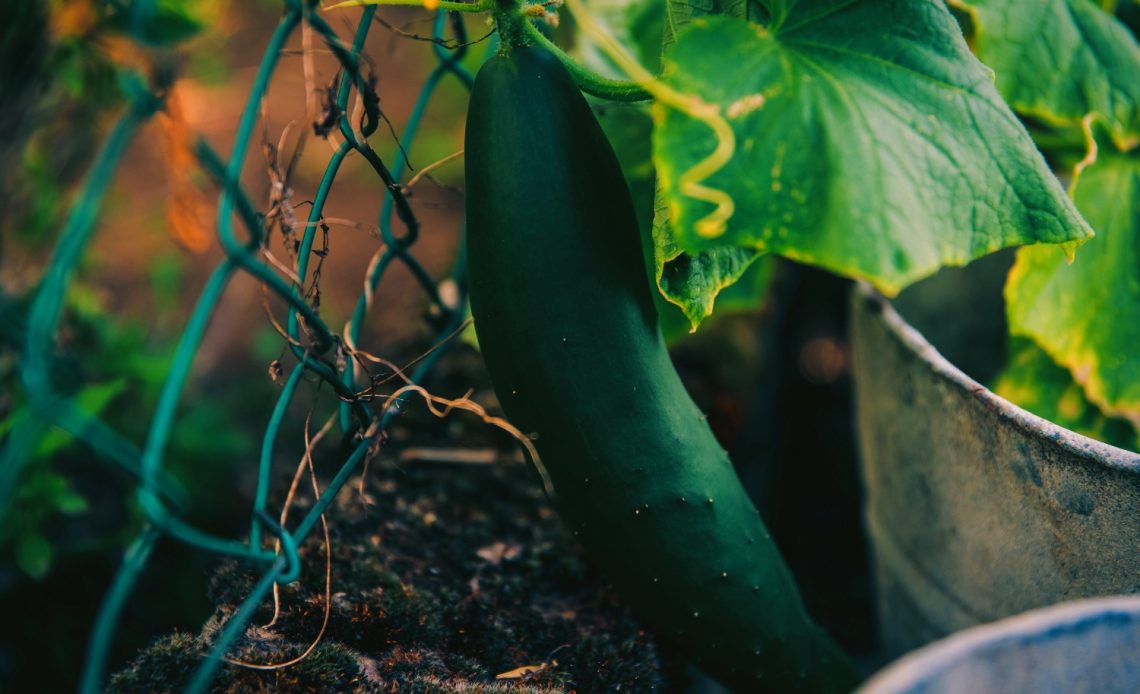

We’re here to help! Wild Yards is a completely free website that is 100% dedicated to helping you create a wildlife-friendly, sustainable yard. Read more
WildYards is reader-supported. When you buy a product through a link on our site, we may earn a comission. Every product is independently selected by our (obsessive) editors and our reviews are unbiased and objective. Read more about our mission or our privacy policy.
Whether you’re new to gardening, or a seasoned pro, cucumbers are a favorite among backyard growers.
These versatile veggies can be sliced for snacking, tossed into fresh salads alongside homegrown lettuce, or pickled to use in sandwiches and burgers.
Whatever you intend to do with your cucumber crop, it’s important to provide the plants with everything they need to grow well. This means not just meeting their light and water demands, but also their nutritional needs.
Using the right fertilizers can make all the difference in the quality of your cucumber crop. It also supports the plant’s maximum fruiting potential, so you get as many cucumbers as possible.
Looking for the best organic fertilizers for cucumbers to use in your garden? Well, you’re in luck! Today, we’re taking a closer look at 18 organic fertilizers that can help your cucumbers grow better.
Bone meal, blood meal, and fish fertilizer provide cucumber plants with essential nitrogen, phosphorus, and potassium. But cottonseed meal, alfalfa pellets, and kelp meal help meet the plant’s other nutritional demands.
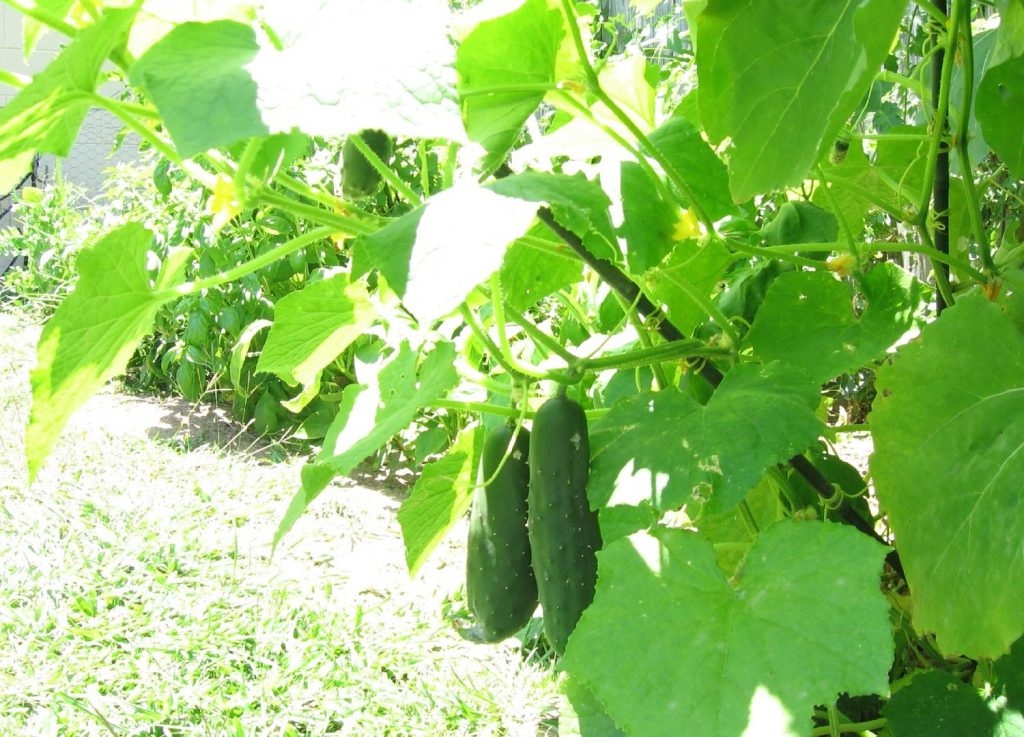
Which 3 nutrients do cucumber plants need the most?
Like all other plants, cucumbers rely on nitrogen, phosphorus, and potassium to grow well. Specifically, cucumbers need moderate amounts of nitrogen and high doses of phosphorus and potassium to grow well.
Nitrogen enhances vegetative growth, allowing cucumber plants to vine out and produce enough leaves to support their energy demands as they continue to mature.
Phosphorus is used to help the plants replicate their DNA and RNA. This way, they can continue growing and producing flowers and healthy fruits. Phosphorus is also important for root development.
Cucumber plants rely on potassium, too, which regulates moisture loss so plants don’t become so stressed when the temperatures rise and water becomes scarce during the summertime.
Trace minerals support healthy cucumbers, too
Nitrogen, phosphorus, and potassium play the biggest role in your cucumber crop’s health. But cucumbers rely on a number of trace minerals to flower and fruit.
Calcium supports root and leaf growth, while also helping prevent blossom-end rot. Manganese and magnesium play important roles in photosynthesis, the latter being a major component of the green pigment, chlorophyll.
Cucumber plants make use of sulfur, zinc, and boron to continue producing new, healthy, strong tissues.
Iron enables cucumber plants to produce vines so they can vine and spread out, while copper and molybdenum are used to make valuable enzymes, to be used in a variety of metabolic processes, including energy use and storage.
All of these elements work synergistically to keep your cucumber crop healthy. Boron influences the way cucumbers use calcium. Molybdenum is essential for plants to use nitrogen.
Because some elements support the plant’s ability to utilize other elements, that makes feeding your cucumber crop all the more important.
Using a variety of organic fertilizers for cucumber plants in your garden will help them produce more flowers, and maximize their fruiting potential.
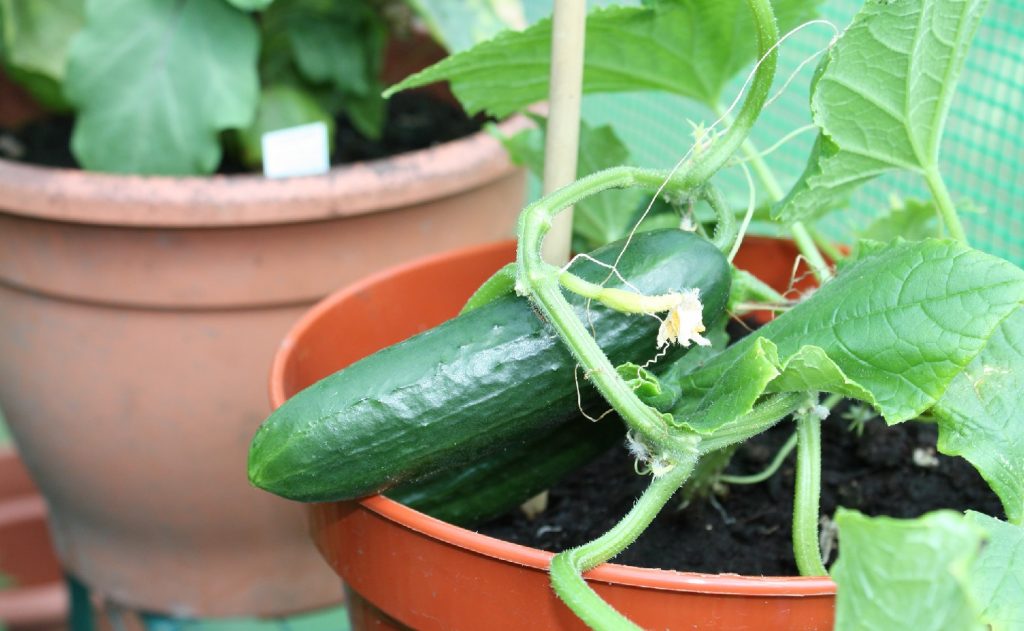
15 Best organic fertilizers for cucumber plants
Cucumbers are heavy feeders, and they grow best when their soil has been amended with a variety of organic plant foods.
So if you want to make sure your cucumber seedlings get a strong start, and that they produce loads of fresh cucumbers for you later on in the season, be sure to use a combination of these 15 organic materials to enrich their soil.
Cottonseed meal
This eco-friendly fertilizer adds nitrogen, phosphorus, and potassium to the soil to help your cucumber plants get started. It’s also a rich source of micronutrients, including zinc, iron, and manganese.
But cottonseed meal doesn’t just enrich the soil. It can also be used to adjust the soil’s pH level. Cottonseed meal is slightly acidic, helping to bring neutral or alkaline soils into the sweet spot at 6.0 to 6.5, where cucumbers grow best.
Cottonseed meal is slow to break down. It’s not a good choice for fertilizing cucumber plants that are showing signs of nutritional deficiencies.
However, cottonseed meal is a great soil amendment to mix into your garden soil before you start planting at the beginning of the season.
Adding cottonseed meal to the soil in spring loosens things up, reducing soil compaction and improving drainage, helping to create an ideal soil substrate that retains moisture while allowing excessive water to drain easily.
Cottonseed meal is considered to be one of the best organic fertilizers for cucumbers because of its ability to enhance cucumber quality, flavor, and crop yield.
Kelp meal
This all-natural fertilizer is an excellent source of a broad spectrum of nutrients, including nitrogen, manganese, zinc, and iodine. But kelp meal is an especially good natural source of potassium.
Since cucumbers have an increased need for potassium, kelp meal can play an important role in their fertilizing schedule.
Kelp meal can help your cucumbers survive stressful situations, including droughts, extreme heat, and even insect infestations.
Kelp meal’s loose, grainy texture means it can be used to add structure to the soil. Its ability to feed soil microbes means it can be used to strengthen your cucumber crop’s immunity.
Because kelp meal is rich in natural growth hormones, it helps stimulate root development. A strong root system supports the health of the entire plant, increasing crop yield and improving cucumber quality.
Cucumbers aren’t the only plants that benefit from being fertilized with kelp meal. Tomatoes, peppers, and potatoes also perform well when fed kelp meal.
For best results, add kelp meal to your garden before planting to support the health of your entire garden.
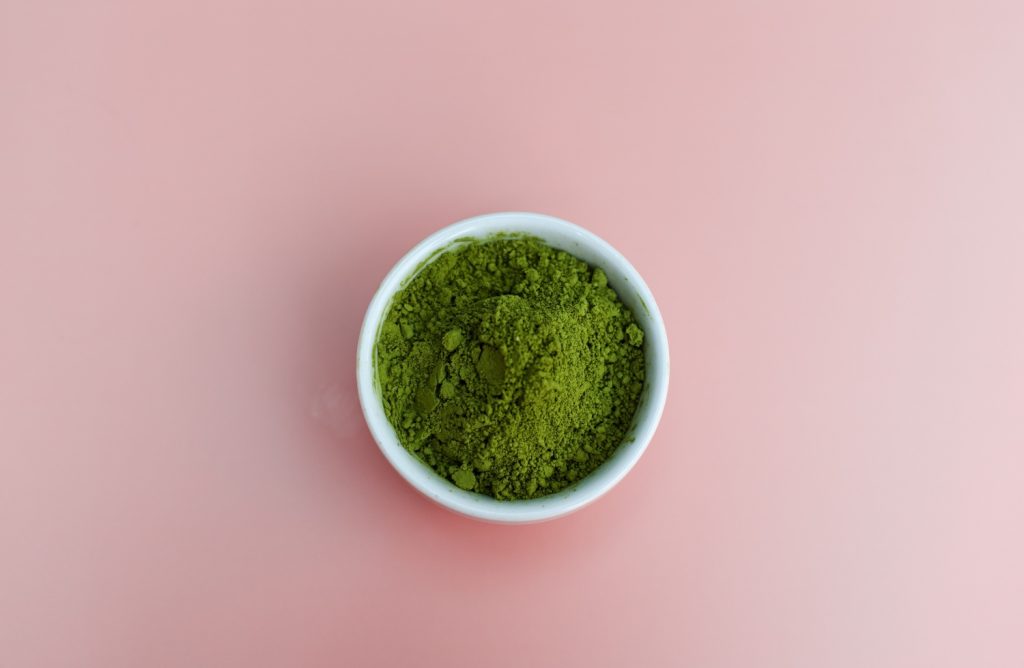
Eggshells
The main benefit that eggshells have to offer cucumbers is calcium content.
Low calcium levels are a major contributor to blossom-end rot, a frustrating condition in which the blossom end of a fruit or vegetable begins to deteriorate, ruining the fruit and causing it to rot before it even ripens.
Although blossom-end rot is most common in tomatoes, cucumber plants can be susceptible to the condition as well.
Fortunately, adding eggshells to the soil can provide your cucumber crop with enough calcium to keep this condition at bay.
You can purchase eggshell powder at some garden centers. But it’s easy enough to make at home.
Simply save your eggshells, rinse them off, allow them to dry, and toss them in your food processor until they’re reduced to a fine powder. It’s that easy.
Store the powder in a plastic bag and keep it in your freezer to keep it fresh. When you’re ready to use it, simply sprinkle a spoonful or two around your cucumber plants.
Eggshell powder is slow-release. It lasts for weeks to months, and adds structure to the soil, too, to keep it from becoming compacted.
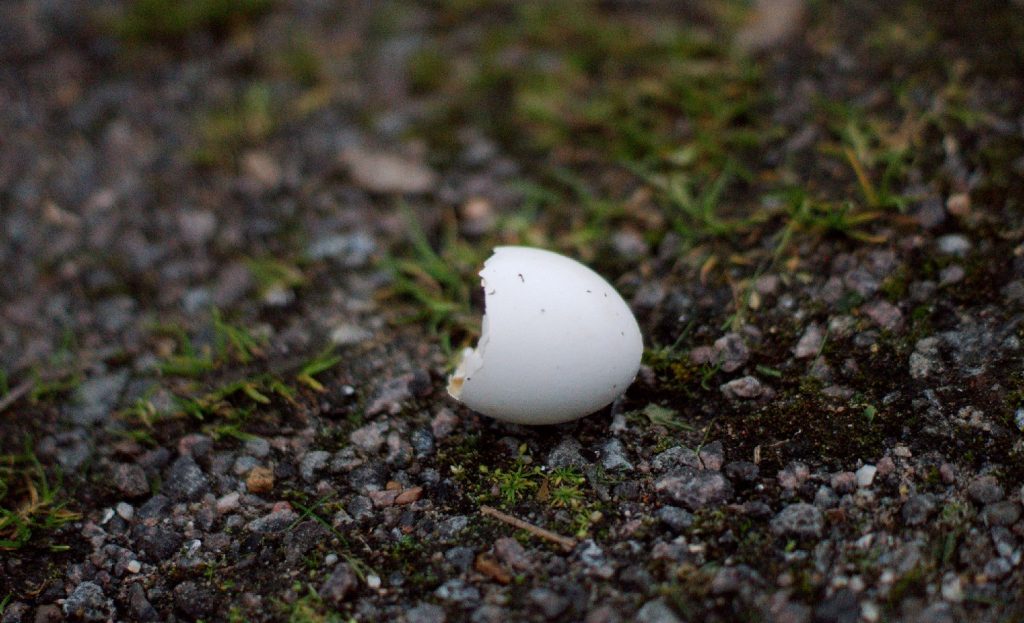
Hair
The thought of using hair to feed your plants may sound strange. But because hair is rich in phosphorus, it’s actually one of the best organic fertilizers for cucumbers around!
Pet hair leftover from brushing your cat or grooming your dog, or even human hair picked out of the shower drain (yuck!), can be used to enhance your cucumber crop’s performance.
Hair breaks down slowly, providing your plants with a steady supply of phosphorus throughout the season.
Because hair is so slow to decompose, it helps to cut it up into smaller pieces before adding it to the soil.
Adding hair to the soil prior to planting is also a good idea. That way, by the time your cucumbers start flowering and their phosphorus needs increase, the hair will have begun breaking down.
You can also add hair to your compost heap every time you clean out your hairbrush or empty your vacuum cleaner.

Feather meal
Feather meal is a very popular organic fertilizer for a variety of plants because it’s rich in nitrogen.
It’s best to apply feather meal to the soil prior to moving your cucumber seedlings to the garden.
A teaspoon of feather meal tossed into the hole just before transplanting will provide your young cucumber plants to give them a good start.
Once your cucumber plants begin flowering, avoid adding more feather meal. Giving the plants more nitrogen at this stage could hinder fruit development.
Banana peels
Fresh bananas are perfect for homemade ice cream sundaes, or adding to fresh oatmeal. If you’re a banana fan, why not save those peels to feed your cucumber plants?
All you have to do is toss empty banana peels in the freezer, allow them to freeze completely, grind them up in the food processor, and voila! Instant high-potassium fertilizer for your cucumbers.
You can add pulverized banana peel to the soil at any time, before, during, or after planting.
It’s a good idea to feed your cucumbers banana peels at the start of summer and again in mid to late summer to help the plants cope with the rising temperatures.
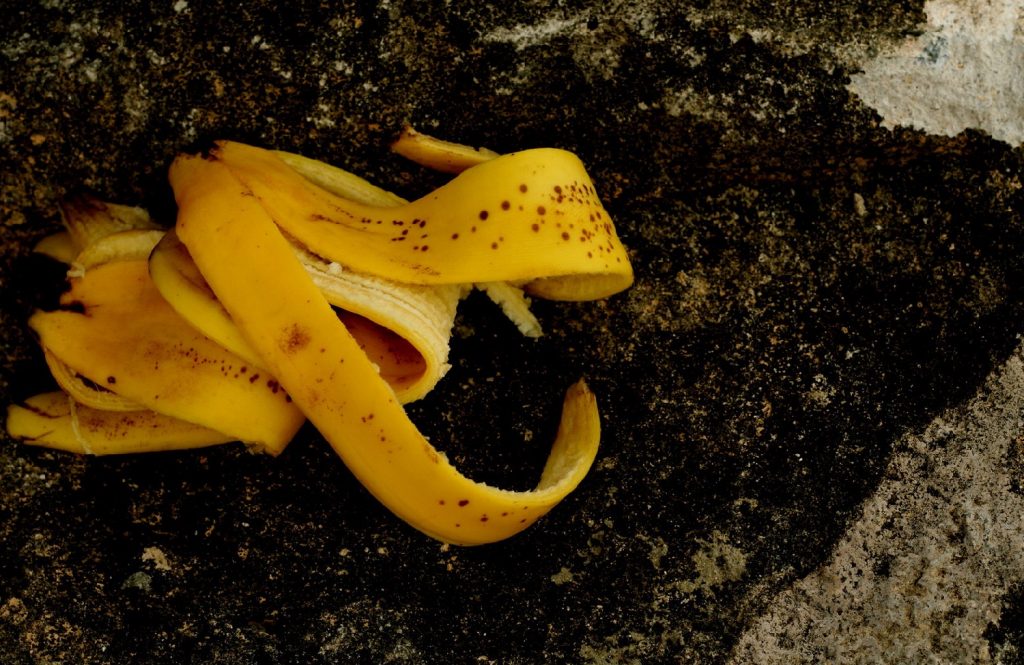
Fish emulsion
If you love seafood and you love gardening, you can combine the two passions by making your own fish fertilizer. But, be forewarned. It’s a stinky process.
Of course, once you see the beneficial impact fish fertilizer has on your cucumber crop, we’re sure you’ll agree it’s worth it!
Cucumbers love fish fertilizer because it’s a great source of nitrogen, phosphorus, and potassium.
Fish fertilizer, whether it’s in the form of an emulsion or a meal, is one of the best organic fertilizers for cucumbers because, not only is it nutrient-rich, but it also feeds the beneficial microbes in the soil.
The decomposing bits of fish meat and skin feed the healthy bacteria in the soil, so they can continue breaking down organic materials and provide your cucumbers with nutrients.

Wood ash
Wood ash is another good source of potassium for growing cucumber plants.
Use those leftover scraps from your burn pile to work into the soil. The ashes will break down quickly, providing your cucumbers with essential potassium.
Once all of the nutrients have been used, the ashes will still help by improving soil texture.
Wood ashes keep the soil loose and airy, so your cucumber crop’s roots can “breathe”, and spread out easily to anchor the plants in place.

Bone meal
Bone meal is another rich source of calcium that can help your cucumber crop stave off blossom-end rot.
In addition to calcium, bone meal is an excellent all-natural phosphorus fertilizer. So it supports your cucumber crop’s ability to produce flowers and, eventually, healthy, high-quality fruits.
Cucumbers produce male and female flowers on the same plants. Male flowers are usually the first to appear, followed by female flowers.
Female flowers can easily be distinguished from male flowers thanks to the tiny underdeveloped fruits situated on the stem just beneath the blossom.
Adding bone meal to your cucumber crop’s soil helps ensure the plant has plenty of phosphorus to produce the maximum amount of female flowers.
Increasing female flowers supports the pollination process, and enables your cucumber plants to produce more fruits.
Mix bone meal into the soil prior to transplanting your cucumber seedlings, and feed the plants another tablespoon right before they begin flowering.
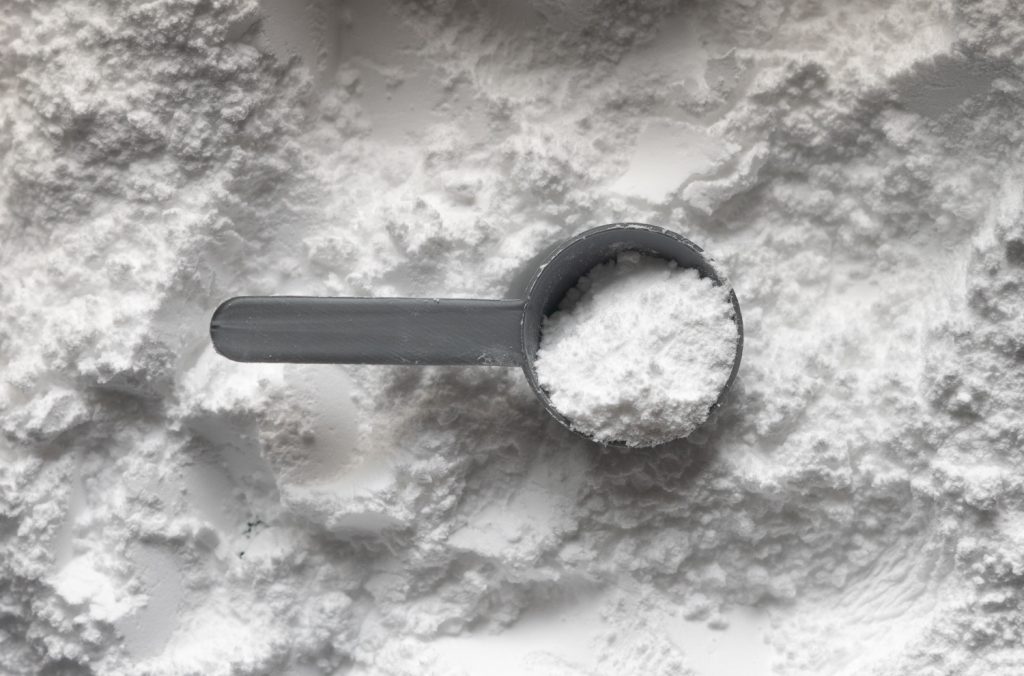
Alfalfa pellets
Alfalfa pellets are a valuable resource for livestock owners and are often recommended by equine veterinarians to treat gastric ulcers. Why? Because they’re rich in acid-fighting calcium.
As it turns out, alfalfa pellets are good for your cucumber crop for the same reason they’re good for horses!
Rich in calcium, alfalfa pellets help prevent blossom-end rot in cucumbers.
These pellets are also a good source of plant growth hormones, which support the healthy microbes in the soil, and strengthen your crops from the roots to the leaves.
Alfalfa pellets act as a time-release fertilizer, introducing bioavailable nutrients like nitrogen, potassium, iron, copper, and zinc into the soil slowly over a period of months.
Use alfalfa pellets to improve your soil’s structure. As the materials break down, they enhance your soil’s ability to retain moisture, while simultaneously improving drainage to ensure your cucumber crop never sits in standing water — a problem that can turn their foliage white.
Blood meal
Phosphorus and calcium are important. But nitrogen plays a critical role in your cucumber crop’s early development.
We love using this organic fertilizer for cucumbers because it can be fast-acting or time-release, depending on how you apply it.
Dissolved in water, blood meal can be used to give nitrogen-deficient plants a quick perk-me-up.
If your young cucumber plants aren’t growing many leaves and have started to turn yellow, liquified blood meal will help them recover quickly and naturally.
Meanwhile, dried blood meal can be mixed into the soil prior to planting or even afterward, to provide cucumber plants with a steady supply of nitrogen as they grow.
Nitrogen-rich synthetic fertilizers, like 34-0-0, are highly effective. Unfortunately, they also put your local waterways at risk of eutrophication, which can have devastating effects on aquatic life as well as wildlife and livestock.
But because blood meal is slow-release, it’s much safer to use and poses a much smaller threat to waterways than synthetic nitrogen fertilizers.
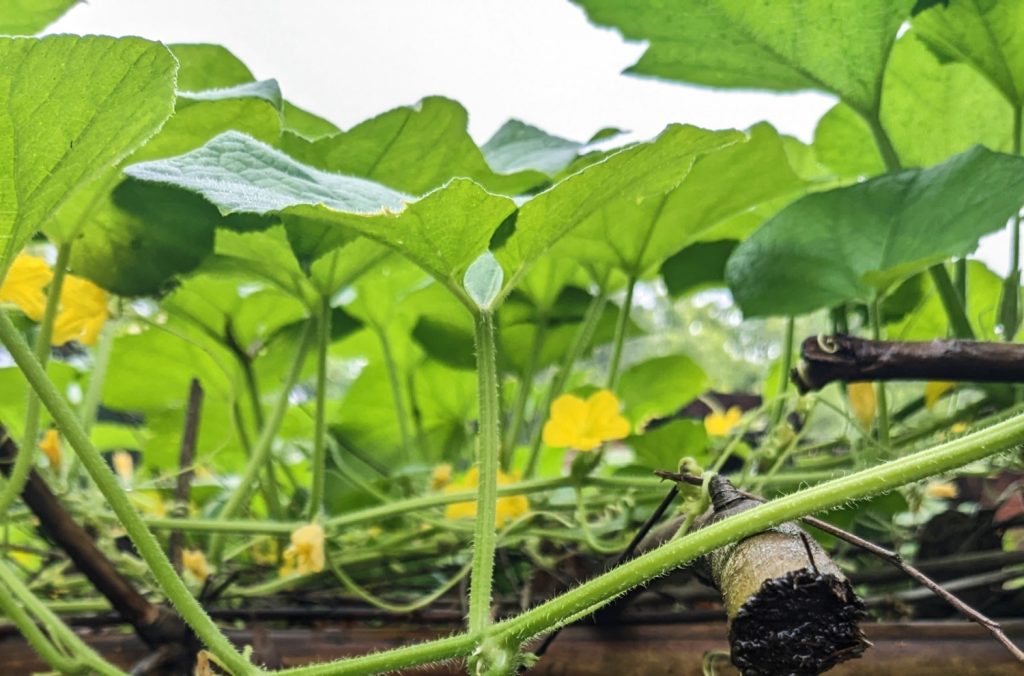
Compost
Homemade compost at a 1:1 ratio of green matter and brown matter can benefit your entire garden, not just your cucumber crop.
But you can alter the nutritional makeup of your compost to suit your cucumber crop’s unique needs.
Add phosphorus-rich materials, like old mushrooms and cooked beans, along with potassium-filled scraps like avocado and sweet potato skins, to create a cucumber-healthy organic fertilizer.
Cucumbers benefit from compost that includes just a bit of bat guano or livestock manure. This gives them an extra shot of nitrogen.
You can also add any of the other organic fertilizers mentioned here to your compost heap to change its nutritional makeup.
Toss eggshells, fish scraps, banana peels, and leftover seaweed from last week’s sushi in the bin, too, to create a nutritious organic fertilizer for your cucumbers.
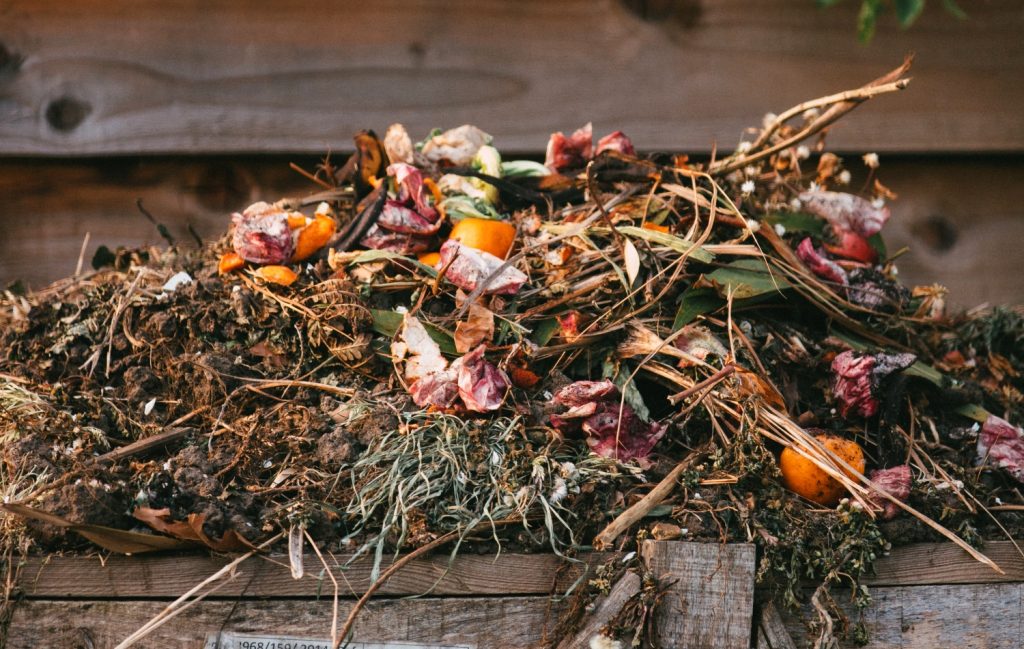
Worm castings
Your garden can only be as good as its soil. If you want to grow the best cucumbers possible, you’ve got to plant them in a high-quality substrate.
Worm castings probably aren’t nutritious enough to be used as the sole fertilizer for your cucumber crop, unless your soil is naturally rich.
However, worm castings can do your cucumbers a world of good by enhancing soil microbe activity and improving soil texture.
Worm castings contain trace amounts of nutrients, including nitrogen, phosphorus, potassium, calcium, magnesium, zinc, copper, and more.
Once your plants use up the nutrients in worm castings, they’re gone.
However, the fibrous material that remains behind continues to add structure to the soil, improving aeration and drainage while also helping the soil retain an ideal amount of moisture.
Overall, worm castings can play a valuable role in your cucumber crop’s health, just be sure to combine it with other materials to enhance its effects.
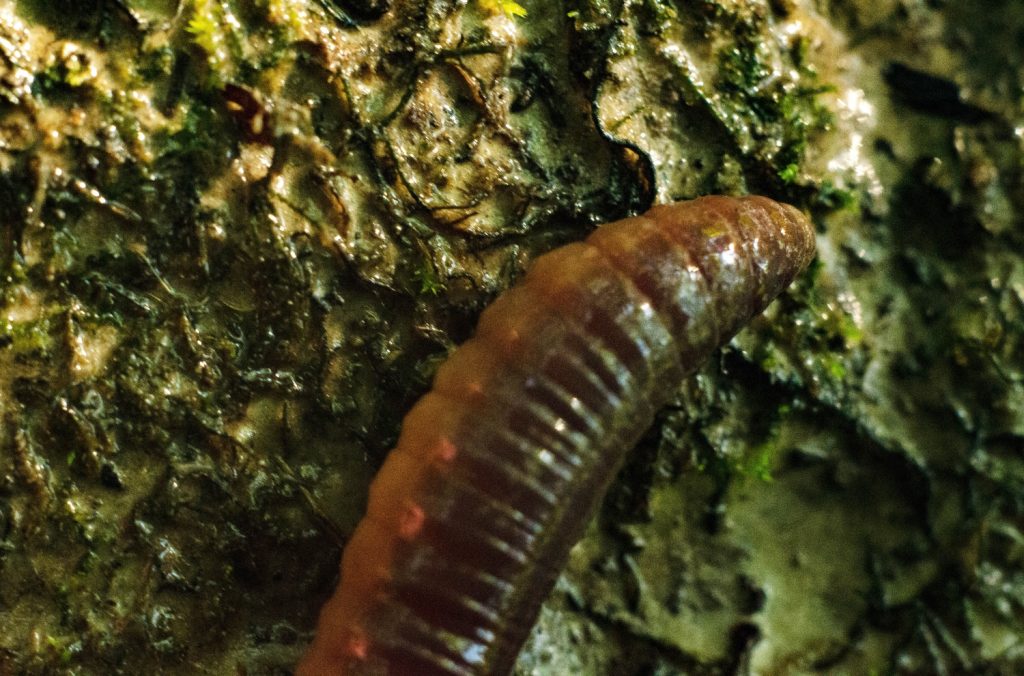
Epsom salts
Although not often thought of, Epsom salts are one of the best organic fertilizers for cucumbers. They’re cheap, they’re a common household item, and they’re loaded with beneficial magnesium and sulfur.
Low levels of magnesium and sulfur lead to reduced yield in cucumber crops. Deficiencies in these minerals also contribute to poor growth and loss of vigor.
But just two tablespoons sprinkled into the soil surrounding your cucumber plant can help improve their health and performance.
Epsom salts can also be dissolved in water and used as a foliar spray, or simply to water the plants.
Epsom salts support healthy green foliage, root development, and flower production. It also enhances fruit quality, so you get uniformly crisp, delicious fruits.
While Epsom salts can improve your cucumber crop’s performance, be sure to avoid overapplication, as it can lead to salt toxicity.
Coffee grounds and tea leaves
Save those leftover coffee grounds and tea leaves and sprinkle them around the soil where your cucumbers are planted.
As these materials break down, they provide your cucumber plants with some extra nitrogen.
Because tea and coffee are slightly acidic, they can also improve substrate quality for your cucumber crop, lowering the pH to a suitable level, and enabling your cucumber plants to absorb nutrients.
Coffee grounds and tea leaves can be mixed into the soil before, during, or after planting.
They can also be added to your compost heap to be used to feed your cucumbers later on.
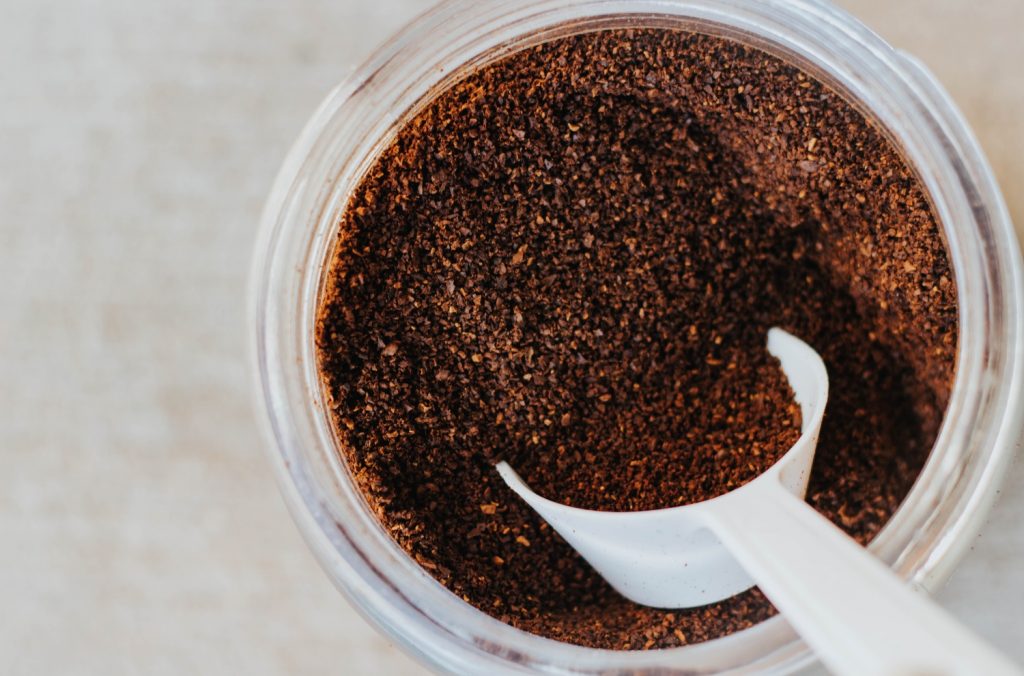
3 Best commercial organic fertilizers for cucumbers
If you haven’t got the time, space, or desire to mix up your own organic fertilizer for cucumbers, you can always buy one, instead!
For your convenience, we’ve chosen 3 of the best organic fertilizers for cucumbers that come ready to use.
Greenway Biotech Cucumber Fertilizer
With an NPK ratio of 8-16-36, Greenway Biotech’s Cucumber Fertilizer contains the ideal percentage of nutrients for your cucumber crop.
This commercial fertilizer is water-soluble. One pound of the mixture can be used to produce around 200 gallons of liquid fertilizer.
So even though it’s a bit of an investment initially, a 2-pound bag will last you multiple growing seasons.
This fertilizer is easy to use and can be mixed and stored in a sealed glass jar to use later on. Another good thing about this fertilizer is that it’s suitable for hydroponic gardens.
Greenway Biotech Cucumber Fertilizer delivers just the right amount of iron, copper, zinc, boron, and manganese.
Although this mix is low on calcium and magnesium it can be amended with eggshells, bone meal, and/or Epsom salts as needed to make it more nutritious.
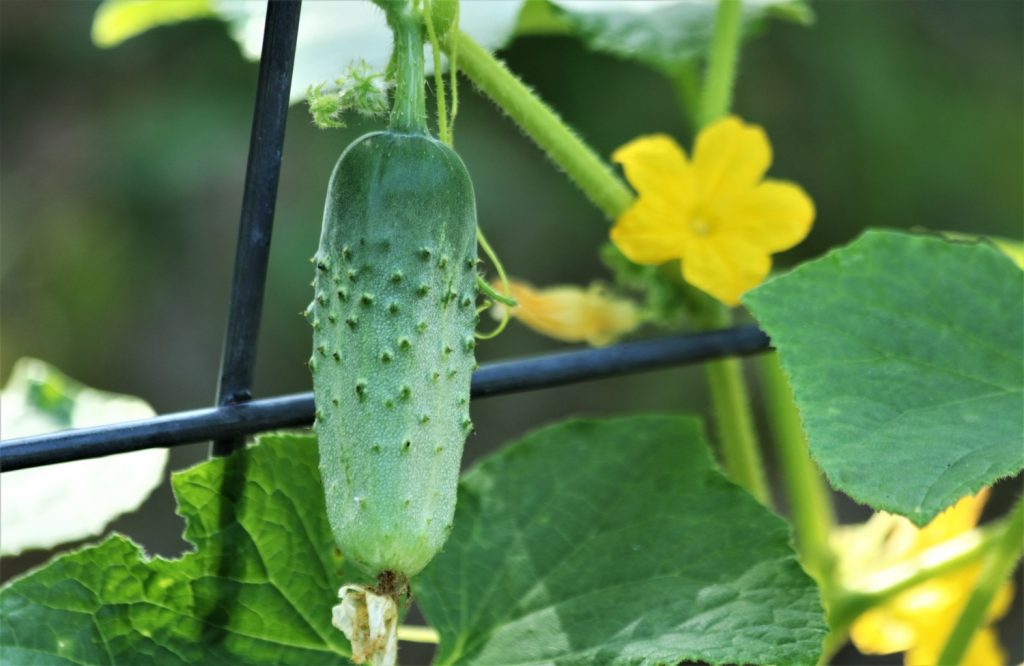
Miracle-Gro Performance Organics
Miracle-Gro Performance Organics is a 7-6-9 fertilizer, suitable not only for cucumbers, but also for tomatoes, strawberries, and lettuce.
This fertilizer is designed to be reapplied every 4 to 6 weeks and has been designed to enhance crop yield, quality, and size.
Sprinkle Miracle-Gro Performance Organics is a mixture of several organic fertilizers, including feather meal, bone meal, soybean meal, and rock phosphate, among other things.
It also provides your cucumbers with some calcium, magnesium, and sulfur, essential trace minerals that will enhance your cucumber’s performance.
Jobe’s Organics Vegetable & Tomato Fertilizer
Cucumbers and tomatoes share many of the same nutritional needs. So it’s usually safe to use tomato fertilizers to feed your cucumbers.
Jobe’s Organics Vegetable & Tomato Fertilizer is one of the best organic fertilizers for cucumbers on the market.
These slow-release fertilizer spikes keep your cucumber plants fed for a period of 8 weeks.
Jobe’s Organics Vegetable & Tomato Fertilizer is a blend of bone meal, feather meal, and sulfate of potash.
Although they contain little to no trace minerals, these spikes nourish your cucumber plants, providing them with the nitrogen, phosphorus, and potassium essential for crop production.
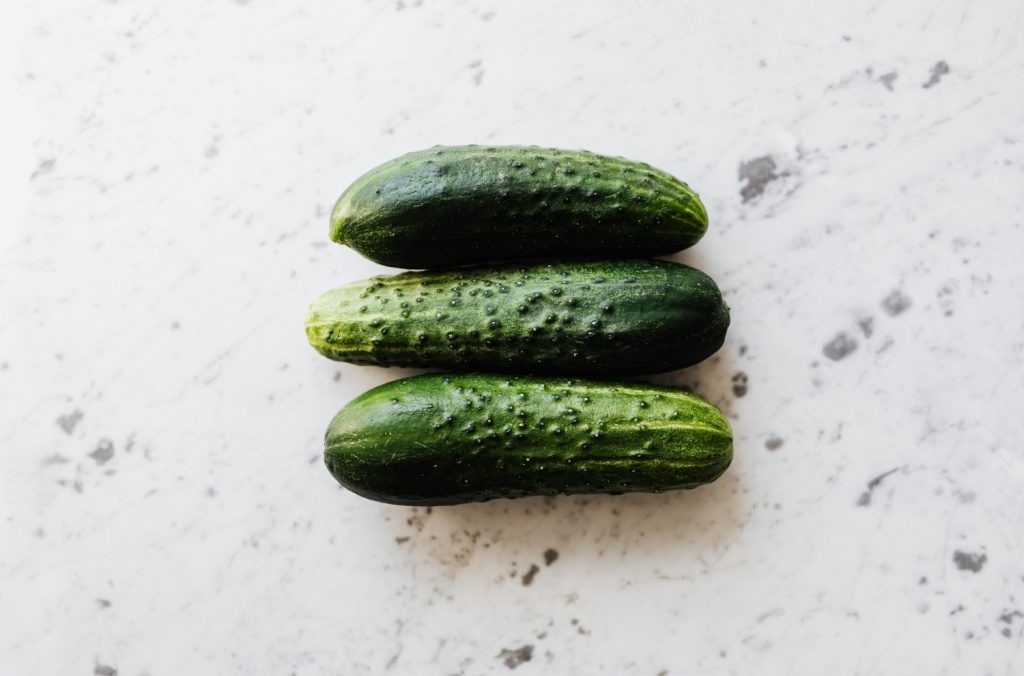
Jobe’s Organics Vegetable And Tomato Fertilizer spikes will keep your plants fed for 8 weeks.
More tips for growing healthy cucumbers
Using a mixture of organic fertilizers will help your cucumbers get off to a great start. But there are other things that you can do to ensure you grow a delicious crop of cucumbers.
Here are a few additional tips for growing tasting cucumbers in your garden.
Water plants regularly
Most cucumber plants need an inch of water per week, but this is subject to change.
Intense heat, droughts, and cultivars also influence how often your cucumber plants need to be watered.
Check the soil often. When it feels dry at a depth of one or two inches, water the plants thoroughly.
Water your cucumbers often, but avoid overwatering them.
Leaving your cucumbers sitting in muddy soil can lead to root rot and/or powdery mildew, both of which can ultimately kill the plants.
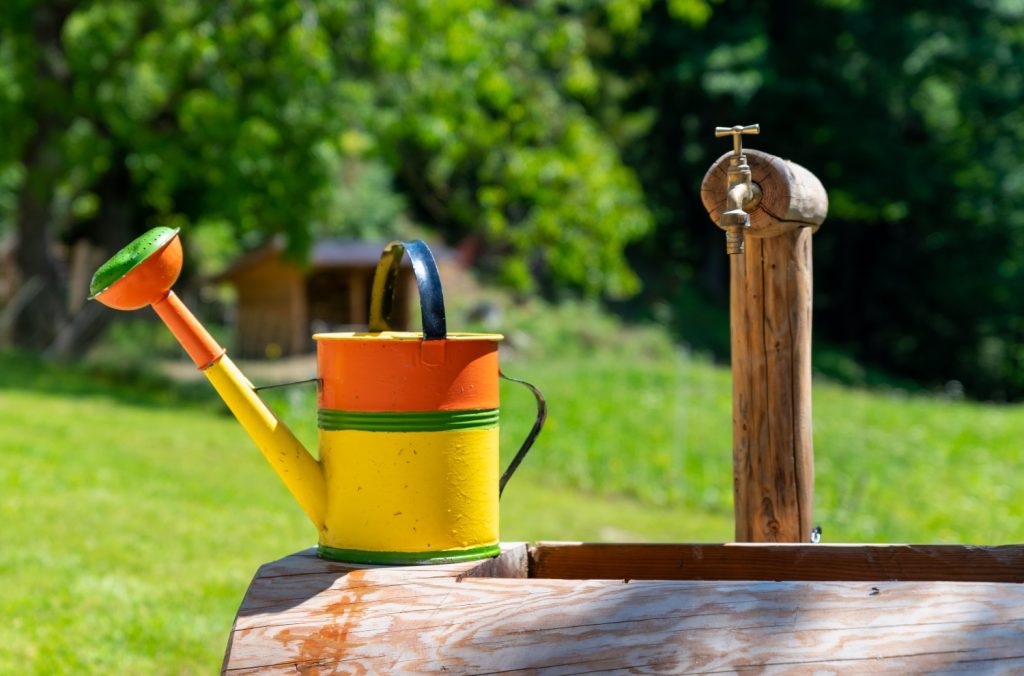
Spread mulch
Cucumbers grow best when their soil can be kept cool and uniformly moist.
Spread a layer of organic mulch, like straw or even shredded paper, to insulate the soil and protect it from the sun’s rays.
This will help seal in moisture, keeping your cucumber plants cooler so they can keep producing, even as temperatures begin to rise over the summer.
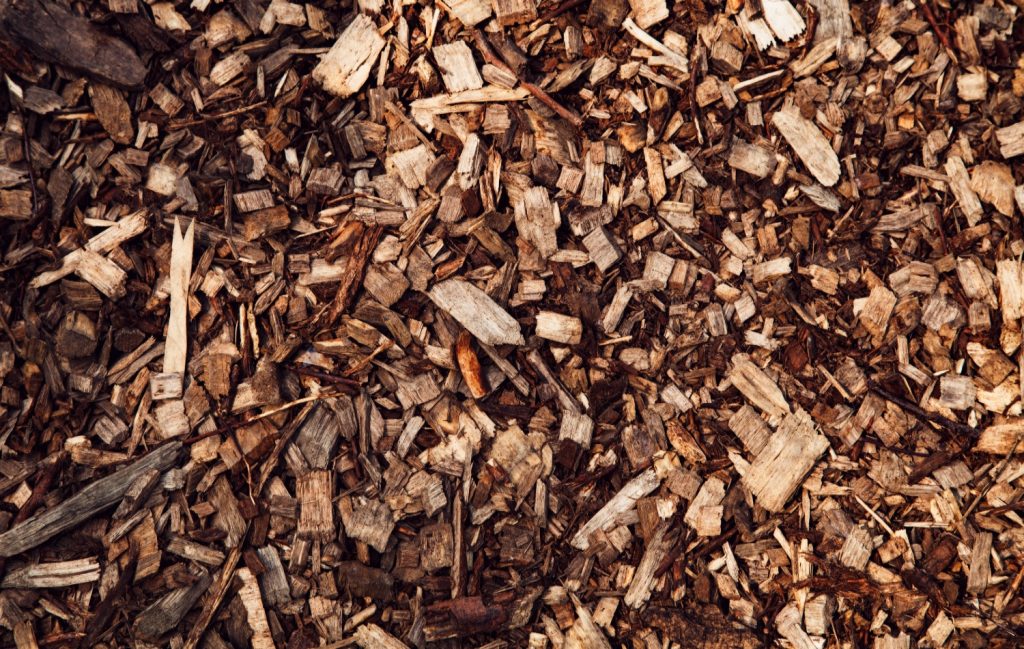
Use cornmeal to prevent weeds
Because cucumbers are heavy feeders, their performance can suffer greatly when they have to compete with surrounding weeds.
But did you know that cornmeal can be used as an all-natural herbicide to prevent weeds from sprouting up?
The gluten in cornmeal acts as a pre-emergent herbicide, preventing many weeds, including crabgrass and dandelions, from sprouting.
Sprinkle cornmeal around the plants in your garden to stop pesky weeds before they start. That way, your cucumbers can have those nutritious fertilizers all to themselves.
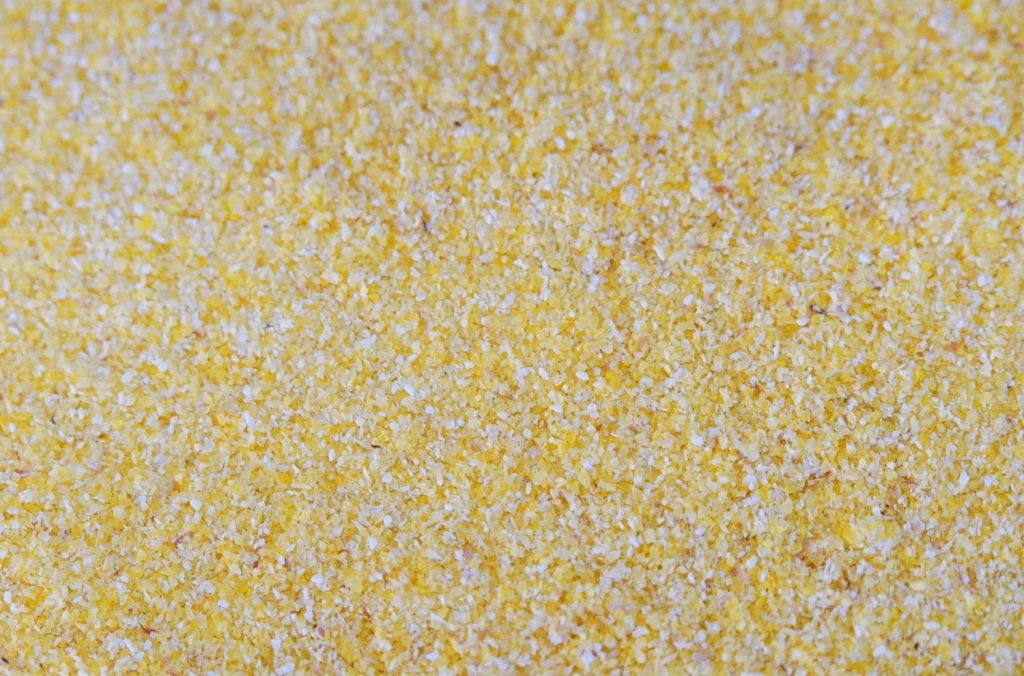
Test soil often
Cucumbers benefit from regular feedings. But overfertilizing them could kill them.
Feeding plants high doses of one nutrient can contribute to relative nutrient imbalances, which can severely hinder your crop’s ability to produce.
For this reason, you’ll need to test your soil before adding any amendments.
It’s just as important to test the soil periodically throughout the growing season to avoid applying the wrong fertilizer.
If you happen to overfertilize your cucumbers, water them deeply to flush out the extra nutrients, allow the plants to recover, retest the soil, and try again.
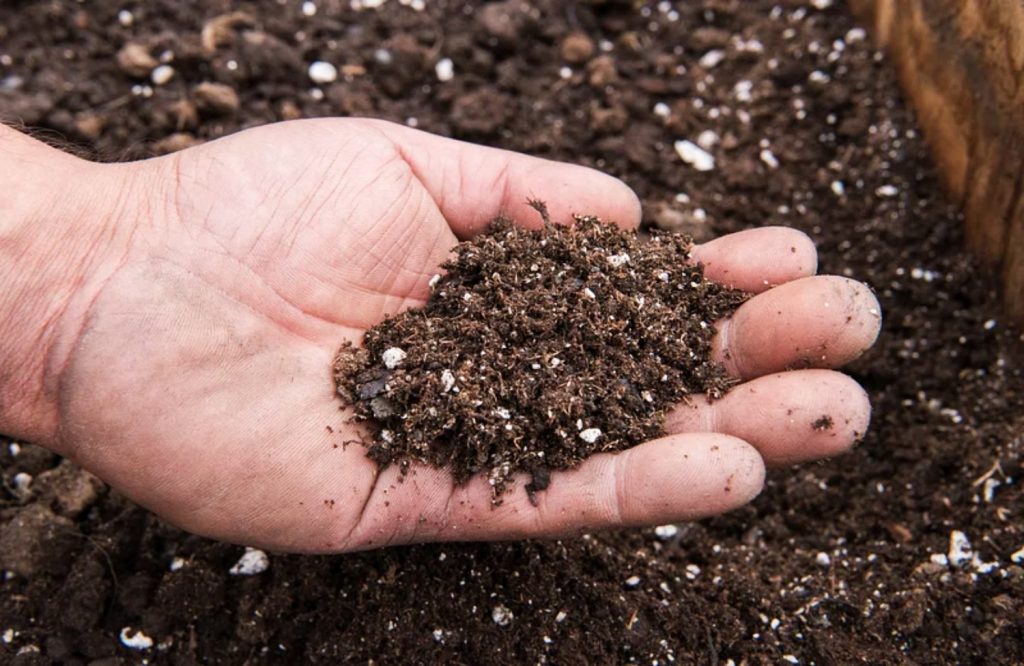
Is growing organic cucumbers worth it?
Growing cucumbers can be labor-intensive, especially if you’re committed to doing so organically.
Ultimately, it’s up to you to decide how much work you’re willing to put into your cucumber crop.
But with proper care and the help of the best organic fertilizers for cucumbers, you can produce delicious, crisp, fresh-tasting cucumbers all season long.
